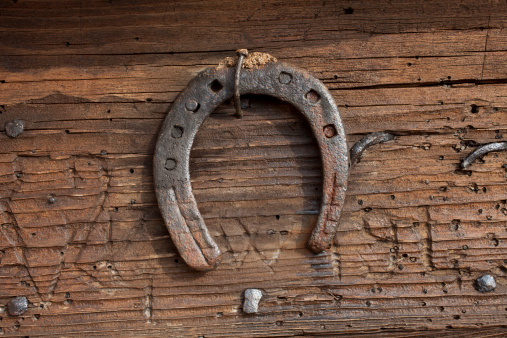
I have always loved horses.
Ever since I looped one of Mama’s belts for a stirrup and mounted the arm of our couch, using a bent coat hanger for a cowboy hat (we wuz broke back then), I have loved horses.
Ever since the days of Trigger and Silver, “My Friend Flicka,” and Black Beauty, I have loved horses. I love the faithfulness of their companionship. I love the elegant beauty they demonstrate when they race. I love their strength and power, which remains to this day the standard by which mechanical engines are measured.
Even now, horses turn my head and, if it’s available, my camera. They’re just magnificent animals.
That said, I’ve rarely ever actually ridden a horse. Only galloped once – thought I was sure to take the dirt nap, or at least have dirt for dinner. [click to continue…]

It all started with that “Welcome to Mobile” sinus headache.
Ever go to bed with a mild ache that says, “You should probably address this before you get in bed?”
Yeah, about that.
I had this dull ache that turned into an evil roar at 3:30 in the morning. Sinuses. Head. Neck. Attitude. Everything was in pain.
I didn’t want to wake people up, and didn’t have a lot of options, so I tried taking a shower. That’s when my wife came in to see what was up.
Did I want some pain medicine, she asked?
Boy, did I.
Now I should mention that the “pain medicine” she referred to isn’t your basic over-the-counter pablum. This was he-man stuff… soon I’d be pain-free and loving everybody.
I should also mention that it isn’t wise to take this on an empty stomach. Bad things can happen. [click to continue…]

In one of old his “Peanuts” cartoons, Charles Schultz has Linus bringing manager Charlie Brown a statistical report on the baseball team. “In twelve games,” he said, “we almost scored a run and in nine games the other team almost didn’t score before the first out. In right field, Lucy almost caught three balls and once almost made the right play.” Then Linus concluded in the cartoon’s last frame with this classic statement: “We led the league in ‘almosts.’”
No doubt about it – Linus is prime preacher material. How many times have you heard a pastor say, “We almost met our offering goal?” Or, “We almost reached our attendance goal.” How many people have you known who almost came to church, who almost decided to follow Christ, or who almost trusted their situation to God? It happens – er, almost every weekend.
Come to think of it, we almost do so many things, we could start a whole new church – the First Church of Hand Grenades and Horseshoes. [click to continue…]

Raise your hand if you want tomorrow to be better than today.
Raise your other hand if you would rather God give you prosperity than calamity.
Good. I’ve got you where I want you. Now give me all your money.
You and I were hard-wired for hope. Something in our DNA makes us want to believe that tomorrow can and will be better than today. When times are easy, we tend to presume on that. When times are tough, we go looking for it.
Maybe that’s why Jeremiah 29:11 has become such a popular verse in recent years. Go into any Christian book store or gift shop and you’ll see it on coffee mugs or on some idyllic painting or poster:
For I know the plans I have for you,” declares the Lord, “plans to prosper you and not to harm you, plans to give you hope and a future.
Doesn’t that do something for you? It certainly does for me. It tells me something about the heart of my God for me as an individual, and for the people I care about.
Trouble is, we take it completely out of context. [click to continue…]

You can get yourself in serious trouble for using the “B” word in some places. Easy girls, I don’t mean that one. I’m talking about balance.
I know several people, in ministry of all places, that come out with guns blazing when people start talking about the search for life balance or balancing the demands of ministry vs. family and all that. “It’s compromise!” they declare. “You give all you’ve got to everything that’s important,” or something like that.
I know some other people who sincerely are trying to keep all the plates spinning. They’ve given up on excellence (sadly) – they’re just looking for survival at work, avoiding bankruptcy, and keeping their kids out of Juvenile Detention. “Balance” for them would be to somehow crawl out of those holes and get back to ground level.
Soon after I wrote that last post on diligence in leadership, I was reading some assignments for a class I teach, the subject of which was life balance. About 90% of them lamented something to the effect of “I stink at this!” Some of what I read broke my heart. Most of these people are mid-life, mid-career professionals who are in – or are headed for – ministry. They have kids, parents, congregations, a full-time masters-level school load, and usually a full-time job to go with it. And here, on Easter week, for crying out loud, we were asking them to write about balance.
All that has my wheels turning and my mental oven preheating. When something’s still in the oven I like to advertise it, so consider yourself warned. What follows is half-baked and still in the oven. But if you’re struggling to find some balance to your life and its multiple demands or feeling guilty because you just can’t seem to keep all the plates spinning, then call a time out.
Stop.
Put these ideas in your oven and let ‘em bake for a while and tell me what comes up. [click to continue…]
 Jordan’s heart is still awake, even though his body surrendered to sleep an hour ago. He’s restless. Anticipating. Watching and listening for that heart connection he once knew. In the psalmist’s language, Jordan is thirsty like a deer panting for streams of water. He knows what he’s thirsty for, and He knows that God is faithful. And yet in this dry season, He feels so far away.
Jordan’s heart is still awake, even though his body surrendered to sleep an hour ago. He’s restless. Anticipating. Watching and listening for that heart connection he once knew. In the psalmist’s language, Jordan is thirsty like a deer panting for streams of water. He knows what he’s thirsty for, and He knows that God is faithful. And yet in this dry season, He feels so far away.
Caitlyn waits all the time, but the nighttime seems the rudest. She waits for a change in her mother’s prognosis, even though no change is coming. She waits for that dreaded decline in respiration, though it seems her Mama is too tough and too stubborn to die. The days keep her busy, but the nights at the bedside turn up the volume on Caitlyn’s grieving heart. She knows that ultimately what she’s waiting for is the Lord. And He feels so far away.
Brody is exhausted. It’s been the longest night of his professional life, but the rookie firefighter forges ahead through the rubble of what once was a safe place for kids; a cruel tornado had other ideas. Keeping his own two children, ages 4 and 2, close in his heart, Brody alternately prays he will find survivors and rages that a just, loving God lets innocent children die. His faith is as weary as his body and mind. He wants to believe God. But He feels so far away.
Cindy sorts through photos and memories of what sometimes looks like someone else’s life. She called it her “days of awakening,” and so they were. Though she had been a believer since she was 11 years old, amazing things began to happen in Cindy’s life when she was a student in college. Unusual, near-instant answers to prayer. Life-changing mission trips where once she even witnessed a miraculous healing. Extraordinary spiritual growth. Now ten years later, Cindy is hungry to see those days of awakening again. But it’s been a long time, and He feels so far away. [click to continue…]

Okay, let’s start an argument. What would you say are the two most important words in the Bible?
You’re wrong.
I know because my two words are (probably) different, and I know I’m right.
Yeah, yeah, I know, they’re all important. But the way I figure it, if the Lord took the time to repeat something over and over and over, He must be getting at something.
Now I have to admit, it took me about 40 years to realize this. Which is about how long it took Moses to figure some things out, too, but I digress. The reason I took so long is because I let my brain check out when it should have been sitting up and taking notice. [click to continue…]
 Something changed that night. And you are the beneficiary. But so many things changed in and around that night that this sometimes gets lost in the shuffle and scuffle.
Something changed that night. And you are the beneficiary. But so many things changed in and around that night that this sometimes gets lost in the shuffle and scuffle.
For three-plus years, Jesus-the-Master had been leading a band of twelve full-time followers. “Disciples,” He called them. And they did what disciples do. Listen. Learn. Serve. Make mistakes. Listen. Lean some more. Serve some more. There were teachable moments and forgettable moments. Fighting times and healing times.
But just before His death, Jesus was giving these loyal men (Judas had already left) a final round of teaching. One guy calls this, “Jesus’ Cram for the Final Exam.” I love it.
Tucked in between these massive concepts about vines and branches and the coming Holy Spirit, Jesus rewrote the contract between Him and those who follow. Read this carefully: [click to continue…]
 I keep a list of Darling Words – words that have a lot of charm or inspire the imagination. “Forever” is one of those words. It speaks of life. Grace. Commitment. And a long, long time.
I keep a list of Darling Words – words that have a lot of charm or inspire the imagination. “Forever” is one of those words. It speaks of life. Grace. Commitment. And a long, long time.
Used poetically, Forever speaks of a depth of love that’s supposed to exceed the way we feel about watermelon or melted cheese on tater tots. It’s supposed to last longer than the latest distraction or the next annoying thing somebody does.
Forever is sometimes used to take a snapshot of a moment or a feeling. It’s the language of a hopeless romantic or magical thinker, inviting someone to a lifetime of adventure.
But more than that, Forever speaks the language of letting go of the past and starting something new. It speaks of a lifetime pursuit worth waiting for or something more powerful than death and the grave.
We come by our attraction to Forever honestly. The Bible says that God has placed eternity in our hearts (Ecclesiastes 3:11). In spite of the vanity of our fallen condition, we are instinctively drawn to love for the long haul and life beyond this lifetime. Why, then, is “Forever” such a fleeting thing? Why don’t connections or commitments last beyond the latest inconvenience or frustration? [click to continue…]
 We live in a disposable culture. “Old” has been redefined by phone companies in terms of seconds, and kommitment has been karikatured by kertain kelebrities as a multimillion-dollar hoax. And in a culture where the official religion is the Church of Relative Truth, disposing of beliefs or vows is old news.
We live in a disposable culture. “Old” has been redefined by phone companies in terms of seconds, and kommitment has been karikatured by kertain kelebrities as a multimillion-dollar hoax. And in a culture where the official religion is the Church of Relative Truth, disposing of beliefs or vows is old news.
Science has made recycling possible, but we’ve taken the plunge with some things – and people – that never should have been “cycled” in the first place. It’s one thing to recycle McDonald’s napkins; recycling children is another story. And some people recycle relationships with little more care than they might recycle motor oil or a milk jug.
Of course, some things should be disposed of, either because they’ve satisfied their purpose or because they hinder our growth and progress. Henry Cloud, in his must-read book Necessary Endings, says,
“Getting to the next level always requires ending something, leaving it behind, and moving on. Growth demands that we move on. Without the ability to end things, people stay stuck, never becoming who they are meant to be, never accomplishing all that their talents and abilities should afford them.”
We can’t be free to let go, however, until we have some clear life anchors – those beliefs, relationships, and commitments that keep us grounded and pointed in the right direction. Simply put, there are some things you should never let go of. The question is, how do you know what to throw away and what to keep? What’s the difference between a relationship or belief that serves as an anchor and one that is more like a ball-and-chain?
Here’s where I would start in your search for life anchors: [click to continue…]









